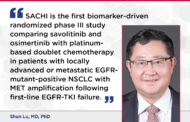
For patients with malignant pleural mesothelioma (MPM)—who often present with advanced disease—treatment options are limited. And while recent advances have expanded options, investigator Quincy Chu, MD, said the benefits were not seen across the board.
“Recently, nivolumab and ipilimumab showed superior overall survival compared to chemotherapy, with a hazard ratio of 0.74.” he said. “However, the largest treatment effects were observed in the non-epithelioid subtype, and 30% of patients experienced grade 3 or higher treatment-related adverse events.”
In searching for more options for this patient population, the phase III IND227 study compared platinum and pemetrexed to platinum and pemetrexed plus pembrolizumab (for up to 2 years). Dr. Chu, who is chair of the Investigational New Drug Committee at Queen’s University, Kingston, Canada, presented the findings from IND227 on June 3 during the American Society of Clinical Oncology’s 2023 Annual Meeting.
“The addition of pembrolizumab to standard platinum pemetrexed chemotherapy in previously untreated pleural mesothelioma resulted in a statistically significant and clinically meaningful improvement in overall survival with a 21% reduction in the risk of death,” Dr. Chu said of the study’s overall survival data.
The trial stratified patients by histological subtype. The primary endpoint was overall survival (OS). Secondary endpoints included tolerability, response, and progression-free survival (PFS). Dr. Chu said several exploratory endpoints were also planned, including the predictive and prognostic value of PD-L1 expression.
In the combination arm, the results showed a statistically significant improvement in OS with p value of 0.0324. At 2 and 3 years, the overall survival was superior with the combination of pemetrexed and pembrolizumab.
In the subgroup analysis, data showed the combination was superior in most subgroups, though Dr. Chu said the data were less clear regarding benefit for patients younger than 65. He also said an exploratory analysis of overall survival by histologic subtype showed more pronounced overall survival improvement in patients with non-epithelioid subtype. However, PD-L1 expression did not predict superior outcome for those in the combination arm, he said.
Improvement in PFS also reached statistical significance in the pembrolizumab combination arm, with a 20% reduction in the risk of progression and death with a p value of 0.0372. Additionally, Dr. Chu said the overall response rate for the combination arm was 62% compared to 38% in the chemotherapy arm, which is also statistically significant.
In terms of safety, Dr. Chu said treatment-related adverse events were as expected.
“Gastrointestinal toxicity was the most common toxicity reported in both arms,” he said. “However, more patients in the pembrolizumab combination arm reported grade 3 and higher treatment-related adverse events at 27% compared to 16% in the chemotherapy arm.”
Given the positive results and tolerability of the combination, Dr. Chu said platinum, pemetrexed, and pembrolizumab should be considered a new treatment combination for patients with previously untreated pleural mesothelioma.





